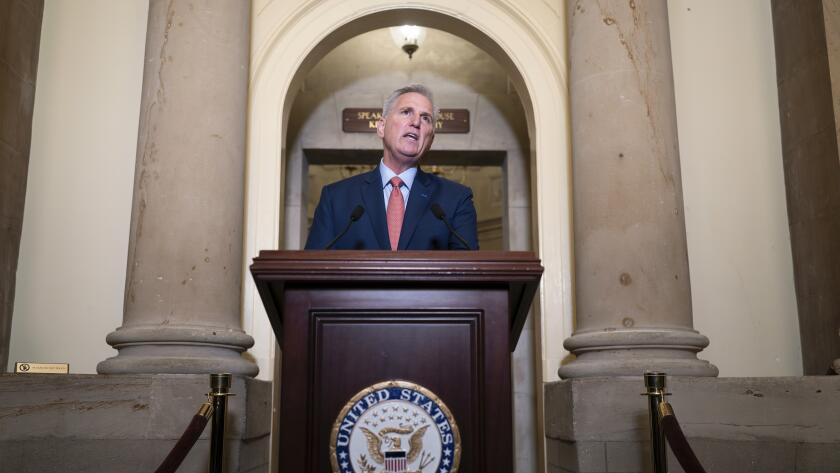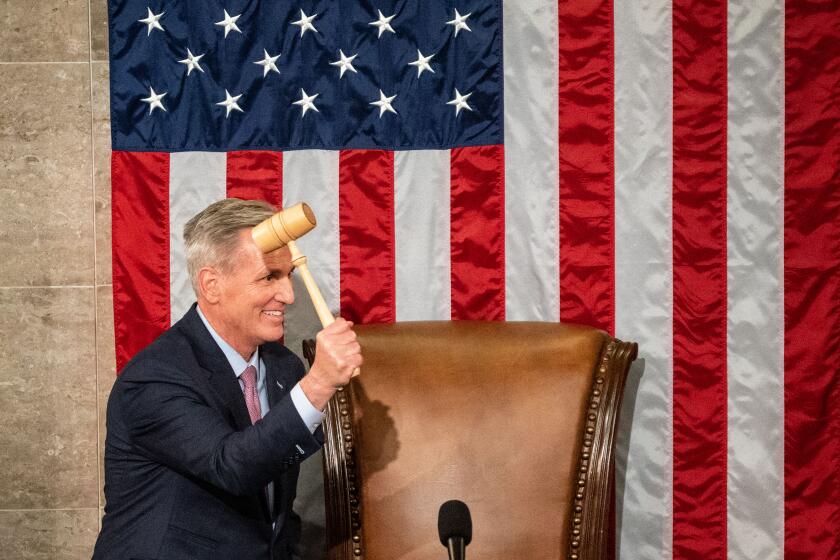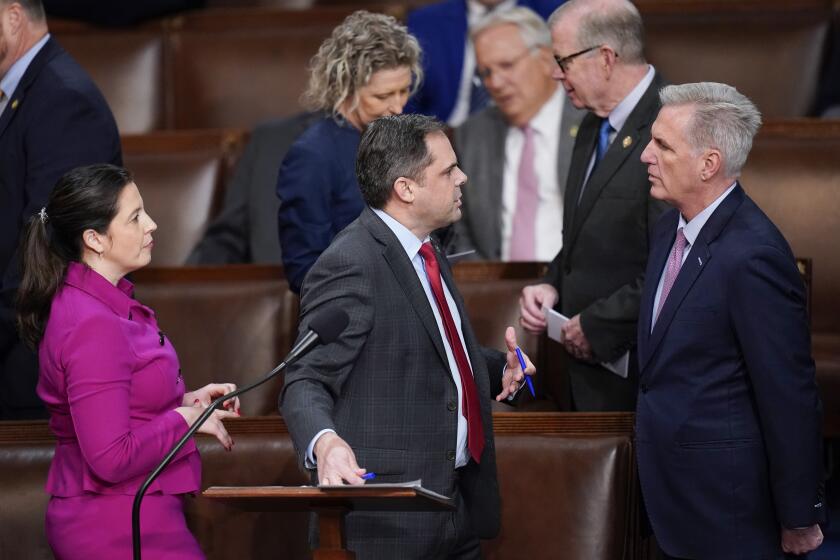Speaker McCarthy launches Biden impeachment inquiry without a House vote
House Speaker Kevin McCarthy says he’s directing a House committee to open a formal impeachment inquiry into President Biden.
WASHINGTON — House Speaker Kevin McCarthy moved to open an impeachment inquiry into President Biden on Tuesday, bowing to pressure from hard-line Republicans who had threatened to oust him if he did not escalate the GOP investigations into the president’s family business dealings.
McCarthy (R-Bakersfield) said at a news conference that GOP-led House probes had found “serious and credible allegations” against the Biden family that “paint a picture of a culture of corruption.”
The allegations center on Biden’s son Hunter Biden and his foreign business dealings before his father became president. For years, Republicans have sought to establish a link between the president and payments made to Hunter Biden, but the GOP-led probes have failed to yield evidence that Biden personally profited from his son’s deals.
“These are allegations of abuse of power, obstruction, and corruption, and they warrant further investigation by the House of Representatives,” McCarthy said. “I don’t make this decision lightly. And regardless of your party or who you may have voted for, these facts should concern all Americans.”
The California Republican’s reign as speaker is dependent on support from the same hard-line Republicans who nearly denied him the gavel in January. McCarthy, who controls a razor-thin majority in the House, will need that group’s support to pass a bill to temporarily fund the federal government, which will otherwise partially shut down at the end of the month.
To win the votes he needed to secure the gavel, Kevin McCarthy had to agree to a series of House rule changes that weakened the power of his post.
Some members of McCarthy’s caucus have said they will not support a temporary funding bill unless it limits aid to Ukraine, slashes the Justice Department’s budget, increases funding for U.S. Customs and Border Protection and resumes construction on former President Trump’s border wall.
Many of the same members have pushed for formal impeachment proceedings for months. By opening an impeachment inquiry, McCarthy can give them some of what they want without adding measures to the funding bill that would keep Biden from signing it.
The speaker’s decision appears to hand Republican investigators the power to subpoena Biden and his family’s bank records.
“This logical next step will give our committees the full power to gather the full facts and answers for the American public,” McCarthy said. “That’s exactly what we want to know — the answers. I believe the president would want to answer these questions and allegations as well.”
The White House has been bracing for House Republicans to launch formal impeachment proceedings ahead of the 2024 election. Biden, who is running for a second term, has sought to distinguish himself from Trump, the leading Republican primary contender, who is facing a string of indictments and investigations into both his private business dealings and his conduct in and after leaving office. During his four years in the White House, Trump was twice impeached by the then-Democratic-led House but acquitted in the Senate.
Ian Sams, White House spokesman for oversight and investigations, called McCarthy’s decision “extreme politics at its worst” in a statement posted on the social media site X, formerly known as Twitter.
“House Republicans have been investigating the President for 9 months, and they’ve turned up no evidence of wrongdoing,” Sams said. “His own Republican members have said so.”
Sams accused McCarthy of going back on his vow to “hold a vote to open impeachment ... because he doesn’t have support.”
McCarthy had been signaling for weeks that he was inching toward launching an impeachment inquiry, but the California Republican previously said he believed the full House should vote on the matter. In 2019, he criticized then-House Speaker Nancy Pelosi (D-San Francisco) for launching Trump’s first impeachment inquiry without a full House vote.
The decision to skip a floor vote underlined the divisions within the GOP, where some more moderate members have expressed skepticism about moving forward with proceedings unless investigators could provide evidence of wrongdoing. Vulnerable California Republicans from districts that Biden won in 2020 will face an uphill battle at home, where moves to impeach him remain unpopular.
Republicans have just a four-seat advantage in the House, so a vote to officially launch impeachment proceedings could easily fail to cross the 218-vote threshold needed to proceed.
A Democratic-aligned group has launched a digital ad campaign targeting Republican representatives whose districts voted for President Biden in 2020.
House Oversight Committee Chairman James Comer, Judiciary Committee Chairman Jim Jordan and Ways and Means Committee Chairman Jason Smith will lead the impeachment inquiry, according to McCarthy.
Democrats on Capitol Hill roundly criticized McCarthy’s announcement on Tuesday.
“Speaker McCarthy and his whole majority surrendered to the extremists today,” Rep. Robert Garcia (D-Long Beach) said in a statement. “There is zero evidence of wrongdoing by the President, and this latest stunt is a clear display of Kevin McCarthy’s political ineptitude. What a loser.”
The inquiry is “regrettable, reckless and reprehensible,” House Minority Leader Hakeem Jeffries (D-New York) said on social media. “It is a political revenge tour that lacks any factual or constitutional basis.”
Many steps stand in between McCarthy’s action Tuesday and Biden becoming the first president to be removed from office: Republicans would have to hold a vote on articles of impeachment, get a majority of House members present to vote to impeach, and then somehow convince two-thirds of the Democrat-controlled Senate to convict Biden on the charges.
If that were to happen, Vice President Kamala Harris would become president.
More to Read
Get the L.A. Times Politics newsletter
Deeply reported insights into legislation, politics and policy from Sacramento, Washington and beyond. In your inbox three times per week.
You may occasionally receive promotional content from the Los Angeles Times.















